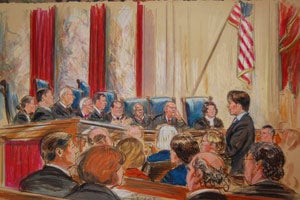On Wednesday, September 9, former HLS Dean Elena Kagan ’86 argued her first case as the solicitor general of the United States, in Citizens United v. Federal Election Commission. The case involves the Bipartisan Campaign Reform Act, a 2002 statute passed by Congress to limit election-related communications, especially so-called “attack ads.”
At issue in the case is a film, “Hillary: The Movie,” that was produced by the conservative advocacy group Citizens United, which portrayed then-presidential candidate Hillary Clinton in an unfavorable light. The feature-length movie was released in theaters and has become available on DVD. Citizens United also had plans to advertise the movie during the presidential campaign season, and to make it available via on-demand cable services before the election. Although the film does not expressly advocate for or against Clinton’s candidacy, the Washington, D.C. District Court held that it was clearly intended to urge viewers to vote against Clinton, and that the promotional ads for the movie would therefore have to follow the same disclosure and disclaimer requirements as political ads.
Listen to audio recording of oral argument. The argument received extensive coverage in the national media, including National Public Radio, The National Law Journal, The New York Times, Slate, and the National Journal.
The case was first heard at the high court in March. In June, the Court ordered re-argument to focus on the constitutionality of limiting corporations’ independent spending during campaigns for the Presidency and Congress. The Court asked the parties to offer their views on whether it should overrule a 1990 decision, Austin v. Michigan Chamber of Commerce, which upheld restrictions on corporate spending to support or oppose political candidates, and part of McConnell v. Federal Election Commission, the 2003 decision that upheld the central provisions of the McCain-Feingold law.
At oral argument, Solicitor General Kagan represented the F.E.C., which has argued in briefs that the lower court’s decision to restrict Citizens United was proper, and that Congress has the authority to restrain corporate spending on communications that are plainly oriented towards supporting or advocating against a particular political candidate. Former solicitor general Theodore Olson represented Citizens United, arguing that money is equivalent to speech and should not be regulated. (As solicitor general under President H.W. Bush’s, Olson argued on behalf of the government in McConnell v. F.E.C. This time, he was representing the other side.)
(Note: On Friday, Sept. 11, Kagan will be at Harvard Law School for a panel discussion, “Views from Washington: Reflections from the Solicitor General’s Office,” with HLS Professors Charles Fried, John Manning and Dean Martha Minow.)
Others heard at oral argument included former solicitor general Seth Waxman on behalf of Arizona Senator John McCain and other members of Congress, and noted First Amendment lawyer Floyd Abrams on behalf of Senate Minority Leader Mitch McConnell.
The hearing took place in a rare special session, in advance of the formal opening of the new Term on October 5. It was also the first Court argument heard by Justice Sonia Sotomayor, who is the first Hispanic member of the Court and only the third woman Justice in history.
